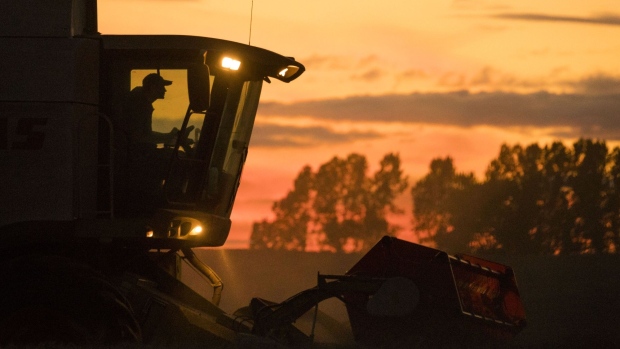Nov 30, 2020
English Farmers Will Be Paid to Go Greener After Brexit
, Bloomberg News

(Bloomberg) -- England’s farmers will begin losing their current state subsidies from next year and instead receive payments for efforts to protect the planet, Environment Secretary George Eustice said.
The new system will be the most wide-ranging overhaul of farming and land management in the U.K. in 50 years as European Union subsidies are phased out because of Brexit. The intention is to encourage farmers to produce healthy food using sustainable practices while generating profits.
“Rather than the prescriptive, top-down rules of the EU era, we want to support the choices that farmers and land managers take,” Eustice said in a speech on Monday. “If we work together to get this right, then I believe a decade from now the rest of the world will be coming here to see how it’s done.”
Farmers are bracing for a loss of subsidies, on top of which they face a number of Brexit-related uncertainties including future trade relations with the EU and beyond. The EU direct payments have been a substantial part of many of their incomes. A 2019 report by the National Audit Office found that about 42% of U.K. farmers would have made a loss without them.
Income Loss
Ministers must be mindful of the impact that sudden drops in income could have, including seriously jeopardizing the viability of a farm business and causing knock-on impacts for the country’s food production, the National Farmers’ Union warned in response to the proposals.
“Expecting farmers to run viable, high-cost farm businesses, continue to produce food and increase their environmental delivery, while phasing out existing support and without a complete replacement scheme for almost three years is high risk and a very big ask,” NFU President Minette Batters said in a statement Monday.
If more farmers go out of business during the transition, the U.K. will have to turn to imports to fill the shortfall in agricultural goods. Greenpeace urged the government to ensure that those imports will meet the same standards imposed domestically.
“The next logical step would be for the government to put a guarantee in law that no future trade deals will water down the crucial safeguards we have to protect people and nature,” said Rebecca Newsom, Greenpeace U.K.’s head of politics.
Plan Details
Poor farming practices are one of the biggest drivers of biodiversity loss and water pollution. The greenhouse gas emissions linked to the sector are some of the hardest to reduce because cheaper alternatives don’t always exist or, if they do, aren’t easily accessible.
Under the government plan, a new “environmental land management” program will be introduced to encourage sustainable farming methods and the creation of habitats and new woodland to help tackle climate change. Payments will also be made to improve animal health, focusing initially on fighting disease.
From 2022, farmers will also benefit from an increased investment in agricultural research and development to trial technologies aimed at the reduction of greenhouse gas emissions, such as new feed additives or autonomous farm machinery.
The change in policy is likely to address one of the most controversial aspects of the EU subsidies -- that richest landowners benefit the most. The U.K. government said it is “poor value for money” and pledged to make the biggest cuts in subsidies to those in “higher payment bands.”
(Updates with comments from NFU from fifth paragraph.)
©2020 Bloomberg L.P.


